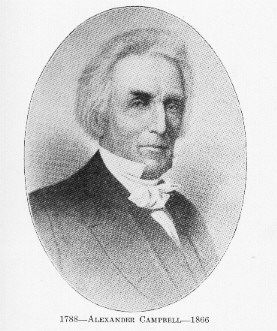Blog
The Judgment of Babylon
Wednesday, May 18, 2022
It seems like the farther we get into the book of Revelation, the more contentious it gets. Our reading for this week concerns chapters 16 through 18, and the main character in this section is the wicked city Babylon, personified as a prostitute. To say that the identity of Babylon is under dispute is to put it lightly. Whole oceans of ink have been spilled in defending one of two main viewpoints, that Babylon is either the city of Jerusalem or the city of Rome.
I happen to identify Babylon with Rome, but there is a more fundamental sense in which this debate misses the point. As always, I think the best way to figure out Revelation is not to look forward and try to make it match up with events after the time of its writing. Instead, we are much better off looking back and studying the language of the Old Testament that it is borrowing. Let's use that approach this evening to figure out what we need to know about the judgment of Babylon.
Our text tonight will be Revelation chapter 18, which is particularly suitable for our purposes because it almost entirely comprises references from the Old Testament. As we examine these source texts, they will help us to figure out what the Holy Spirit wants us to understand. Not surprisingly, they are about the judgment of cities from the time of the kingdom of Judah.
The first such text is about the judgment of the literal city of Babylon. Let's read from Revelation 18:7-8. This is taken from Isaiah 47:5-9. The parallels here are clear. Just like the Babylon of Isaiah described herself has a queen who never would know mourning, the Babylon of Revelation says the same thing. John obviously wants us to connect these two events.
Second, John uses language from the judgment of Edom. Look at Revelation 18:2. Our source text this time is Isaiah 34:6, 11-14. Isaiah goes into more detail, but we see that the same creatures are present in both texts: unclean birds, unclean beasts, and even demons. All of these will inhabit the ruins of a city that opposed God. John doesn't only want us thinking Babylon. He wants us thinking Edom too.
He also wants us thinking about the judgment of Tyre. Consider Revelation 18:11-19. This time, we need to go to Ezekiel 27. In fact, John uses so much of this text that we don't have time to read it all. Let's take a sample, though, from verses 12 and 13. This is the start of a catalogue of trade goods like the one in Revelation 18. Notice particularly the description of the slave trade as a trade in human souls or lives. Also, in Ezekiel 27: 28-32, we see sailors and merchants lamenting the fall of the city. They're doing the same thing in Revelation.
Finally, John uses language from the judgment of Jerusalem. Let's go here to Revelation 18:21-24. This time, John is working with Jeremiah 25:1, 8-10. It's easy to see that both texts contain the light of a lamp, the sound of a millstone, and the voices of a bridegroom and bride. These are the products of ordinary human activity that will cease after God's judgment.
When we put all of this together, we see how shortsighted it is to behave as though God’s judgment is exclusive to any one wicked city or nation. In the time of Isaiah, God promised to judge the wickedness of the whole world, and He did. As I said, I happen to think that this week's reading is about Rome. However, the language of Revelation 18 applies just as well to first-century Jerusalem. We know that it was a wicked city that God judged, and this is the timeless language of God’s judgment.
Nor should we think that this judgment language has had no application since the fall of Rome. Nowhere in Scripture do we see God resigning His position as the great King of the nations, and He has not ceased to control their rise and fall. Thus, it is reasonable to look at Revelation 18 and see it as predicting the downfall of Germany and Japan in 1945 because they too were wicked nations that paid the price for their wickedness.
This is both reassuring and alarming. It reassures us because we can be certain that God continues to rule the fate of nations now. The wicked may prosper for a time, but ultimately, they will fall before His wrath.
However, we must remember that one of the cities that was judged was Jerusalem. God's judgment is not only for other places. If our nation is wicked, it will fall upon our heads too. This takes us to our final text from Revelation 18, verse 4. It comes from Isaiah 52:11. Interestingly, this text also is cited by Paul in 2 Corinthians 6:14-18.
The message for us is plain. Because God is sure to judge Babylon, we must make sure that we don't belong to Babylon. This was true for Christians who lived in Jerusalem or Rome, and it is true for Christians who live in our wicked nation. This doesn't mean that we must emigrate. Instead, it means that we must hold ourselves apart and not participate in the wicked deeds that are inviting God's judgment. If we will not “come out from among them and be separate”, we will not escape their fate.
A Word About Preaching
Monday, May 16, 2022
These days, it seems like most of what I read about preaching on social media is negative. Interestingly, almost all of the people responsible for this negativity are preachers themselves. They point out all the ways that preachers are mistreated in the brotherhood and appeal for more kindness and respect.
I can't help but wonder whether the behavior these stories describe is more responsible for the current preacher shortage, or whether the stories themselves are. It's not hard to imagine young men who otherwise would take up the sword of the Spirit being deterred by thought of the potential negative consequences for themselves and for their families. I don't deny that preachers often are treated badly or that these were genuine experiences. However, by themselves, these narratives misrepresent the reality of what it means to be a preacher.
Now that my own time in the pulpit is drawing to a close, I can reflect on both the highs and lows of my preaching experience and what it has meant to me. My conclusion is simple. I am humbled and thankful that I had the opportunity to preach the gospel.
We live in a society that is so fake and meaningless that its members crave nothing more than authenticity and meaning. These past 18 years that I have been preaching the gospel, I have done what was most important to me, and I have lived a life that was saturated with meaning. Right now, I wouldn't trade that for all the money in the world!
Part of this joy has come from studying and writing about the Bible. Because I am a writer, being able to spend my life in the word has been akin to being a painter who gets to live in the Louvre. I do not regret a second that I have had the Book open in front of me, and it has been a delight to use my writing to share it with others.
However, the people my work has brought into my life are more important to me than every word I have ever written. We make much of how the Scriptures are inspired by God, and they are. It also is true, though, that the most ordinary person on the planet has had the breath of God breathed into them too. The depth of the Bible reveals its divine origin, but the unfathomable depths of humankind reveal us as God's greatest work.
It has been my privilege, then, to spend my life surrounded by and immersed in the people of God. As their preacher, I have seen them at their best and their worst, their noblest and their basest. They have shared themselves with me and given me a life of unimaginable richness.
It hasn’t all been good, of course. I could tell some stories too if I were of a mind to do so. However, all the troubles I’ve had were caused in part by my own failure to love and understand others. If you want to find a blameless-victim preacher, your search won’t end with me.
Why be a preacher, then? If you love the word and love people, there’s no better way to learn to love both better. As a side benefit, if you find yourself dying of ALS one fine day, you get to look back and be utterly satisfied with the life you’ve lived.
Also, to all the people who have been members anywhere I’ve ever preached: I love you. Thank you.
Glorifying God the Hard Way
Thursday, May 12, 2022
One of the most off-putting visions of praise in the book of Revelation appears at the beginning of Revelation 19. Many of the elements here are familiar. The 24 elders and the living creatures from Revelation 4 and 5 make an appearance, and they are joined by a numberless multitude that also is praising God. The text is filled with hallelujahs.
The behavior of God's servants here does not trouble us, but their motivation does. They are glorifying God because he has judged the notorious prostitute Babylon, and the smoke of her burning is rising up forever. That's not very nice! Shouldn’t they be mourning that God had to reluctantly destroy Babylon instead?
However, this praise that seems so inappropriate to us reveals something vital about God. It is right for His people to rejoice at the humiliation and downfall of His enemies because He is glorified in that too.
The iron law of God's creation is that all of it must bring glory to its Creator. Most of the time, this is a straightforward process. The stars glorify God every night as they have since the fourth day. The birds sing His praises; the mountains are memorials to His majesty. All of these honor Him, and they have no choice but to do so.
At first glance, it seems that the role of human beings is different. God created us with free will. We can choose whether we are going to serve Him or not. A few live for Him, but most serve themselves. They will go to their graves never having glorified Him.
However, human rebellion against God's purpose cannot defeat it. God must be glorified, and indeed God will be glorified. Paul promises us that on the day of judgment, every knee will bow, and every tongue will confess that Jesus Christ is Lord to the glory of God the Father. No one will be able to avoid honoring Him on that day.
Nor does the working out of God's glory end there. When His enemies are cast out from His presence, He will exhibit their eternal ruin as a sign of their folly and His power. It didn't have to be that way. They could have chosen to use their free will to honor Him in life. Instead, their just punishment will forever commemorate His ultimate triumph and their ultimate defeat.
This presents us with a stark choice. We are going to glorify God, whether we like it or not. We can glorify Him the easy way by offering Him our willing obedience. If we refuse, we will glorify Him the hard way, as the unhappy losers in the cosmic struggle between good and evil.
None of us want to be the eternal equivalent of the Nazis in World War II. We want to be the victorious soldiers in the parade, not the prisoners of war. However, even though the devil likes to confuse the issue, those are the only two options. If we will not choose the first, the second will be chosen for us.
The Bible I Want
Tuesday, May 10, 2022
I want a different Bible. By this, I don’t mean that I want the latest fancy goatskin Bible in my preferred translation. My hands are bad, and it’s difficult for me to use paper Bibles anymore. Rather, I want a Bible that says different things than the Bibles I already own.
I want a Bible that says that the road to life is broad and found by many. It doesn't contain specific instructions about salvation or the church. This new Bible would say that sincerity is enough. Then, I wouldn’t have to fear for my Methodist neighbors or have awkward conversations with them. They’d be fine already.
I want a Bible that allows women to teach and exercise authority over men in the church. My sister and my wife are good Bible students and gifted public speakers, more so than I am. My new Bible would let them take the pulpit just as I do. As a side benefit, it wouldn’t make me look like such a Neanderthal!
I want a Bible that doesn’t condemn the practice of homosexuality. I have friends and loved ones who are caught up in that sin. Some of them would get baptized tomorrow, if only this stumbling block were removed.
In my new Bible, I’d take the stumbling block right out. I like those people! Why cause them pain by telling them that God hates their behavior?
I want a Bible that allows divorce for any good reason. There are a lot of terrible marriages out there in which people suffer greatly. I don’t like telling them that they must not separate what God has joined together. For that matter, I don’t like disagreeing with my brethren who make emotional arguments in favor of divorce. I take no pleasure in Scripture-checking people.
My new Bible would let the good people whom I like get divorced, and it would let them get remarried too. It’s so hard to live alone! My revision would let them find happiness with someone else.
I want a Bible that is different in many other ways too. Its message would conform to the world and to my own inclinations, instead of demanding that everyone conform to a revelation that has not changed in 2000 years.
However, there’s a problem with the Bible I want. In my new Bible, I would be lord, and Jesus wouldn’t be. All of the above are my ideas, not His.
I am dying. It’s a cliché to say that Jesus is my only hope, but words cannot convey the desperate clarity with which I see that truth. I have no other hope left.
If I follow the Bible I want and appeal to Him for help at the last, He has told me what His reply will be. He will ask, “Why did you call me Lord and did not do what I said?” It chills my soul even to imagine hearing those words.
I don’t want the Bible I have, with so many hard sayings and painful demands, but I cling to it with all my strength. I strive to honor and proclaim it, whatever the cost. I have no alternative.
By contrast, the Bible I want is a luxury I can’t afford.
Create More Than You Consume
Wednesday, May 04, 2022
In Ecclesiastes 12:11, the Teacher notes that all proverbs are given by one Shepherd. I don’t think this means that every wise saying from every society is literally inspired. Rather, the point is that the more wisdom a proverb contains, the closer it comes to the Source of all wisdom and to His revealed word.
This is certainly the case with an epigram I first saw attributed to Jeff Bezos a year or two ago, though I would guess that somebody else came up with it first and he merely popularized it. Regardless, the world’s richest man wants us to know that the secret to success in business and indeed in life is this: Create more than you consume.
It certainly has the counter-intuitive quality that we associate with Scripture, doesn’t it? The world wants us to believe that the secret to life success is, simply: Consume. Put yourself first. Take what you want. If somebody else comes out on the short end of the deal, how tragic and sad. They should have paid better attention.
By contrast, worldly wisdom declares the creator (as opposed to the self-indulgent taker) to be a chump. He works hard churning out all this stuff for others, but he never gets back what he put into it. Otherwise, he wouldn’t be creating more than he consumed. He is the natural prey of the consumer. What a tool!
And yet. Jeff Bezos didn’t get eleventy hundred billion dollars by thinking about what he wanted. He made all that money by figuring out what others wanted and creating a way to get it to them. By contrast, the guy who is focused on what he wants is sitting at home on the couch watching The Price Is Right because he walked out on his job at the Kwik Mart (after having worked there for three whole weeks) when the manager got on his case.
“Create more than you consume” matters if you want unimportant stuff like money. It matters a whole lot if you want eternal life. We usually don’t describe God as the Consumer, but we call Him the Creator all the time. That’s probably a hint about which direction both of those words are aimed.
So too, Paul says of Jesus in 2 Corinthians 8:9, “Though He was rich, for your sake He became poor, so that by His poverty you might become rich.” Is the Lord a creator or a consumer?
We must ask the same question about ourselves. It’s easy for us to be consumers, even as Christians, to do nothing but take in our churches, families, and friendships. However, if we are primarily parasites, the relationships that we feed off of will sicken and die. Paradoxically, though, when we seek to give more than we take, we nourish them, and they in turn nourish us. To say things another way, the one who seeks to save his life will lose it, but the one who loses his life for the sake of the Lord and the gospel will find it.
Create. Give. Lose. The world will think you’re an idiot, but God won’t.


